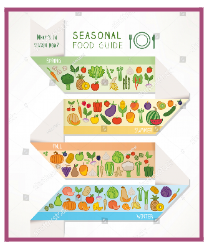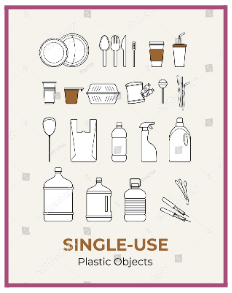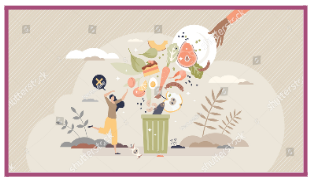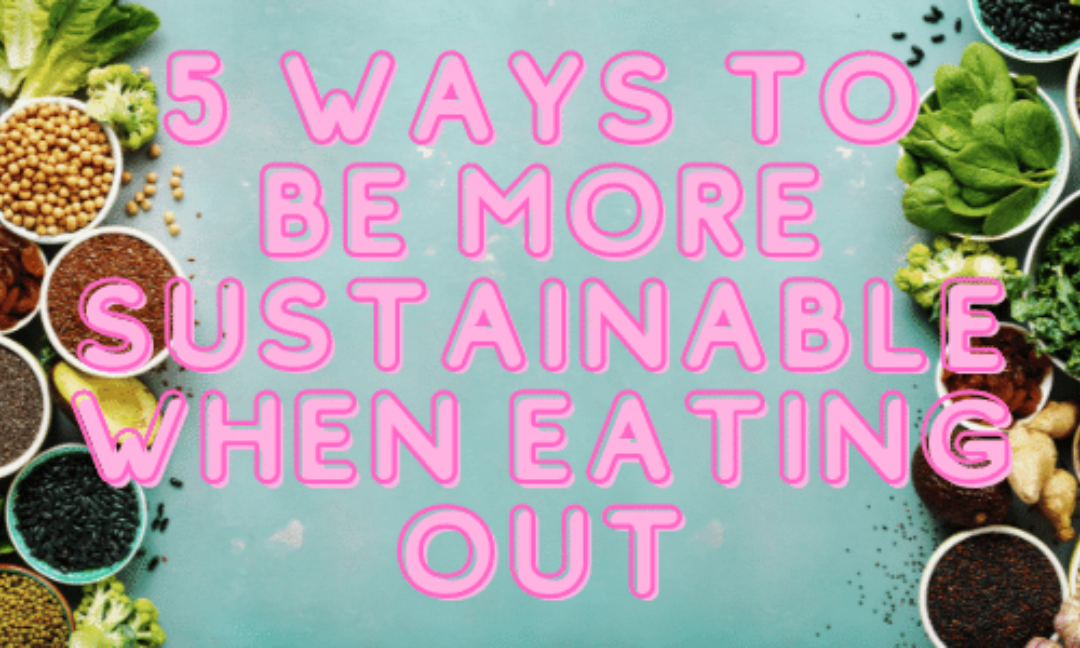5 Ways to Be More Sustainable When Eating Out
Written By: Deana Bjedi
Edited By: Deana Bjedi
Designed By: Howie Nguyen
Published By: Howie Nguyen
Who doesn’t love the occasional meal with friends and family at their favorite restaurant? Dining out is a great opportunity to try new food and cuisines and to spend some quality time with friends and family. The experience of eating out is really fun but what if I told you it can be super unsustainable. Restaurants are often very wasteful, particularly with food and (single-use) cutlery. This can be due to poor stock management by the restaurant itself but also due to us being wasteful with the food we order. That’s why I will share 5 tips to help you be more environmentally conscious and sustainable next time you eat out.
Eat Seasonally
Tip number 1 is to eat seasonally even when you are at a restaurant. Just as you would when you cook your meals, do some research on what’s in the season that month. Now you know what ingredients to look out for on a restaurant menu. Try to choose a meal that is mostly made with thin-season ingredients. You can also look up the menu of the restaurant online beforehand and if there aren’t many seasonal meal options then you can even pick another restaurant.
Avoid Buffets
Tip number 2 is to avoid buffets. Buffets have their pros as they provide customers with a large variety of food options usually at a relatively low price. However, they certainly have their cons. Besides being super unsanitary and the food not being fresh most of the time, buffets are also super wasteful. If we think about it, buffets always have large amounts of food available. A lot of this food may simply get thrown away due to being leftover by the end of the day. The food is also wasted because when we’re at a buffet and we see the endless amount of food around us, we are always tempted to fill our plate up with more than we can realistically eat. This means we also end up wasting most of the food on our plates. If you still insist on eating at buffets, do your part by not overfilling your plate and not wasting your food.
Avoid Single-Use Plastic
The third tip is to avoid single-use plastic. Some restaurants may offer the option to take your food to go and this would mean that your food gets wrapped in some kind of packaging and you may receive some plastic cutlery. We cannot control the type of packaging or cutlery a restaurant uses but we can try to go to restaurants that provide recyclable packaging and cutlery and ensure that we dispose of them correctly. You can even bring your container and ask the staff (if you feel comfortable) to serve your food or drinks in your Tupperware. If all of this seems too much to some of you then you can start by simply refusing plastic cutlery and straws and using your own. When it comes to refusing single-use plastic, every small step counts because even small efforts are better than nothing.
Eat Less Meat
The fourth tip I have for you is to eat less meat. Eating less meat and choosing meatless options more often can reduce your carbon footprint and help the environment. This is because livestock farming causes a lot of greenhouse gas emissions thus also causing several types of pollution. Animal agriculture currently accounts for around 14.5% of greenhouse gas emissions. This is another tip where every small effort counts, if you are not able to permanently stop eating meat then try having at least one meatless meal next time you eat out. Try to implement this in your daily life as well, not just when you eat out.
Don’t Waste Food
The last tip on this list is to not waste food. You can do this by ordering only what and how much you will realistically eat. If you know your meal will be served in a large portion then plan on sharing your food with someone else. If you do not end up finishing your meal then take your leftovers home. Referring back to our single-use plastic tip, you can bring your reusable container to store your leftovers, this way you avoid single-use plastic and food waste all in one.
As you can see, it is possible to be sustainable even when eating out. Even the smallest efforts can make a difference, so always try your best to be more environmentally conscious.
References
Clowes, A. (2018, April 9). Rethinking the buffet: 3 things hotels can do now to reduce food waste. World Resources Institute. Retrieved July 22, 2022, from https://www.wri.org/insights/rethinking-buffet-3-things-hotels-can-do-now-reduce-food-waste
Eating less meat, more plants helps the environment. Greenpeace USA. (n.d.). Retrieved July 22, 2022, from https://www.greenpeace.org/usa/sustainable-agriculture/eco-farming/eat-more-plants/
Edwards, J. R. (2020, May 3). 10 reasons to eat less meat. REDUCETARIAN FOUNDATION. Retrieved July 22, 2022, from https://www.reducetarian.org/blog/2019/1/26/10-reasons-to-eat-less-meat
Link, K. (2021, March 17). Dining out sustainably. FoodPrint. Retrieved July 22, 2022, from https://foodprint.org/dining-out-sustainably/
Image Sources
https://www.shutterstock.com/image-vector/seasonal-food-produce-guide-vegetables-fruits-308239256
https://www.shutterstock.com/image-photo/food-buffet-catering-dining-eating-party-392404696
https://www.shutterstock.com/image-vector/plastic-singleuse-objects-vector-illustration-set-1224907813
https://www.shutterstock.com/image-photo/various-meatless-protein-foods-vegan-sources-1338686216
https://www.shutterstock.com/image-vector/food-waste-meal-leftovers-garbage-reduce-1977398840

